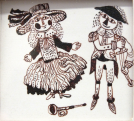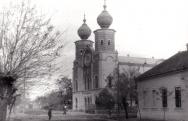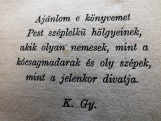2024. April 25. Thursday
András Jósa Museum - Nyíregyháza
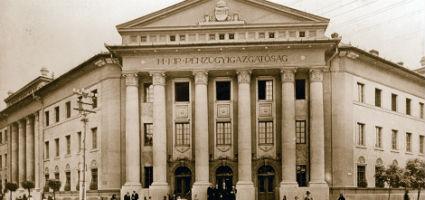 |
Address: 4400, Nyíregyháza Benczúr tér 21.
Phone number: (42) 315-722
E-mail: info@josamuzeum.hu
Opening hours: Tue-Sun 9-17
|
The exhibition has closed for visitors.
2016.04.17. - 2016.05.31.
Museum tickets, service costs:
|
Ticket for adults
|
600 HUF
|
|
|
Ticket for students
|
400 HUF
|
|
|
Ticket for pensioners
|
400 HUF
|
The Tevan family was probably the earliest of the jewish families settled in Békéscsaba during the first decades of the nineteenth century. The new, two towered synagogue of the New Religion was finished in 1893, which was a realistic mirror of the social situation and communal respect of the Jews of Békéscsaba. Next year the new orthodox synagogue was built too./ Adolf Tevan grew up in this dynamically developing city, and he founded his family here. He was the father of ten children. The family belonged to the merchant community of the New Religion. Adolf Tevan opened a convenience store and a soda water manufacture at first, later on he tried some other enterprises, before he bought the printing factory and paper store of Lajos Lepage in 1903.
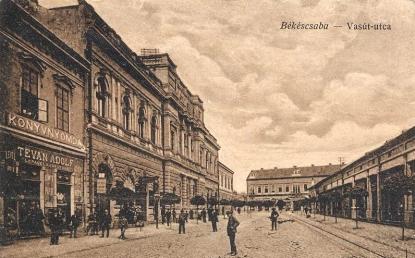
After his studies in Vienna between 1907 and 1909, Andor Tevan took the management of the factory , and he used the new forms of printing arts to publish the books written by the first generation of authors, inspired by the Nyugat.
Besides Endre Ady, Dezső Kosztolányi, Frigyes Karinthy, Gyula Krúdy and Géza Csáth’s works, the Tevan Library Series presented numerous works from novelists from abroad – such as Anatole France, Tristan Bernard, Pul Claudel, Thomas Mann, D’Annunzio.
Andor Tevan launched the Tevan Library Series in 1910, it consists 83 books, then he created an other series of books, called Tevan Amateur Series, these are best works of the contemporary Hungarian literature in a very exclusive design, due to its looks and content, the series reached a well deserved popularity. Besides the books, the firm launched an own magazine, and printed seven daily, weekly papers. At the same time, the family actively took part int he social and cultural life of Békéscsaba, they founded the „Aurora Club”, which gave chance to Béla Brtók for a recital in Békéscsaba. During the 1920-es the business profile had changed: the family firm started to produce paper boxes and wrappings, playing An important role in the marketing- and advertising business in Hungary.
The German oppression on the 14th of March in 1944. brought a through change int he situation of the Jewry of Békéscsaba. In April 24 of them had been deported, among them were Andor Tevan and Rezső Tevan too, they were taken to Austria, Andor Tevan was deported to Vienna, Rezső Tevan was taken to Bergen-Belsen. After the end of world war II., ont he 15th of March in 1945, the factory had been reopened, Andor Tevad led the firma s long as he had to „offer” in to the State. The las Tevan book had been finished in 1948, the Stories of Jacob, the Spit-Roller by Anatole France, which had been announced by the Hungarian Bibliophile Society as the „most beautiful book of the year”. After this, in 1949 Gyula Ortutay, the Minister of Religious Affairs and Education gave the Pro Arte Medal of Honor to the Tevan factory, as the „symbol of the national gratitude for his dedication and decade-long work for the artistic publishing and literature”.
Andor Tevan was perfectly aware of the changes, and of the fact that his factory will be taken by the state soon, he decided to finish all of the constructions he had to postpone in 194 4, obtaine huge loans and finished the new complex. After this in the spring of 1949 he offered his factory to the state. On the 16th of May in 1949, the state confiscated the factory. Andor Tevan worked there for a couple of months as a clerk, then he was fired in 1950, later he worked as an artistic coordinator at the Móra Publisher. In his last years he wrote a monograph, titled: „The thousand years long journey of the Book”, which was a basic reading for generations who studied the history of printing in Europe and Hungary. The Tevan Print Company had been renamed as National Printing Company of Békés, then in had been united with the factory in Gyoma, and had been called Kner Print, in 1964.
About me:
I’m Ildikó Tevan, great-granddaughter of Adolf Tevan, granddaughter of Adolf Tevan’s 9th child, László Tevan. Sorrowfully, I didn’t know my grandfater, he is victim of the holocaust, listened to my Grandmother’s tales about the history of the family and the company. I collected the Tevan books from second hand bookstores, but I didn’t have possibilities to fulfill my idea about my family, only now, as an adult. As a constructing engineer, teacher of engineering, later a computing expert and teacher of programming, I thought and think that the example and guided activity is very important in the education of our children. As a mother of three children and an experienced teacher of problematic children, I encountered numerous situations, where the verbal instruction wasn’t enough, I had to show and my students had to experience. Slowly I decided that besides publishing books and leading book-making clubs I’d like to show the life, the example of the Tevan family, the history and working mechanisms of the factory, and the outstanding works of the artists, who were members and friends of the family, not only to the children, but the older generations too. All of these, as I mentioned before, were installed into a computer-helped, multimedia-supported exhibition, where the visitor can attend a class about the exhibition, try his or her knowledge and play with computer, and if he /she feels like, can make his/her very own toothpaste box too.
As the great-granddaughter of Adolf Tevan, decided to take care of the Tevan-heritage with the help of a Foundation, on the centenary of Tevan Print. The Tevan Foundation presents the family, the factory, its multileveled artistic activities, publications and the printing tools in an interactive exhibition, helped by multimedia tools, making a tour around Hungary. Using the possibilities of the interactive tools (infodesks, computers, iVoice system), the exhibition plans to give gainful experiences to all generations, giving all the help for understanding and absorbing the informations. During the openings of the events well-known musicians played some of the music that might was played at the Tevan house, to give back some of the athmosphere of that age.

After his studies in Vienna between 1907 and 1909, Andor Tevan took the management of the factory , and he used the new forms of printing arts to publish the books written by the first generation of authors, inspired by the Nyugat.
Besides Endre Ady, Dezső Kosztolányi, Frigyes Karinthy, Gyula Krúdy and Géza Csáth’s works, the Tevan Library Series presented numerous works from novelists from abroad – such as Anatole France, Tristan Bernard, Pul Claudel, Thomas Mann, D’Annunzio.
Andor Tevan launched the Tevan Library Series in 1910, it consists 83 books, then he created an other series of books, called Tevan Amateur Series, these are best works of the contemporary Hungarian literature in a very exclusive design, due to its looks and content, the series reached a well deserved popularity. Besides the books, the firm launched an own magazine, and printed seven daily, weekly papers. At the same time, the family actively took part int he social and cultural life of Békéscsaba, they founded the „Aurora Club”, which gave chance to Béla Brtók for a recital in Békéscsaba. During the 1920-es the business profile had changed: the family firm started to produce paper boxes and wrappings, playing An important role in the marketing- and advertising business in Hungary.
The German oppression on the 14th of March in 1944. brought a through change int he situation of the Jewry of Békéscsaba. In April 24 of them had been deported, among them were Andor Tevan and Rezső Tevan too, they were taken to Austria, Andor Tevan was deported to Vienna, Rezső Tevan was taken to Bergen-Belsen. After the end of world war II., ont he 15th of March in 1945, the factory had been reopened, Andor Tevad led the firma s long as he had to „offer” in to the State. The las Tevan book had been finished in 1948, the Stories of Jacob, the Spit-Roller by Anatole France, which had been announced by the Hungarian Bibliophile Society as the „most beautiful book of the year”. After this, in 1949 Gyula Ortutay, the Minister of Religious Affairs and Education gave the Pro Arte Medal of Honor to the Tevan factory, as the „symbol of the national gratitude for his dedication and decade-long work for the artistic publishing and literature”.
Andor Tevan was perfectly aware of the changes, and of the fact that his factory will be taken by the state soon, he decided to finish all of the constructions he had to postpone in 194 4, obtaine huge loans and finished the new complex. After this in the spring of 1949 he offered his factory to the state. On the 16th of May in 1949, the state confiscated the factory. Andor Tevan worked there for a couple of months as a clerk, then he was fired in 1950, later he worked as an artistic coordinator at the Móra Publisher. In his last years he wrote a monograph, titled: „The thousand years long journey of the Book”, which was a basic reading for generations who studied the history of printing in Europe and Hungary. The Tevan Print Company had been renamed as National Printing Company of Békés, then in had been united with the factory in Gyoma, and had been called Kner Print, in 1964.
About me:
I’m Ildikó Tevan, great-granddaughter of Adolf Tevan, granddaughter of Adolf Tevan’s 9th child, László Tevan. Sorrowfully, I didn’t know my grandfater, he is victim of the holocaust, listened to my Grandmother’s tales about the history of the family and the company. I collected the Tevan books from second hand bookstores, but I didn’t have possibilities to fulfill my idea about my family, only now, as an adult. As a constructing engineer, teacher of engineering, later a computing expert and teacher of programming, I thought and think that the example and guided activity is very important in the education of our children. As a mother of three children and an experienced teacher of problematic children, I encountered numerous situations, where the verbal instruction wasn’t enough, I had to show and my students had to experience. Slowly I decided that besides publishing books and leading book-making clubs I’d like to show the life, the example of the Tevan family, the history and working mechanisms of the factory, and the outstanding works of the artists, who were members and friends of the family, not only to the children, but the older generations too. All of these, as I mentioned before, were installed into a computer-helped, multimedia-supported exhibition, where the visitor can attend a class about the exhibition, try his or her knowledge and play with computer, and if he /she feels like, can make his/her very own toothpaste box too.
As the great-granddaughter of Adolf Tevan, decided to take care of the Tevan-heritage with the help of a Foundation, on the centenary of Tevan Print. The Tevan Foundation presents the family, the factory, its multileveled artistic activities, publications and the printing tools in an interactive exhibition, helped by multimedia tools, making a tour around Hungary. Using the possibilities of the interactive tools (infodesks, computers, iVoice system), the exhibition plans to give gainful experiences to all generations, giving all the help for understanding and absorbing the informations. During the openings of the events well-known musicians played some of the music that might was played at the Tevan house, to give back some of the athmosphere of that age.

